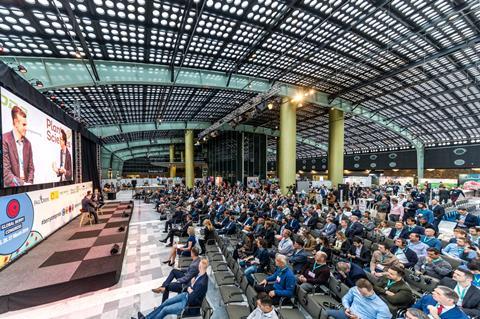
A record 580 people from 50 countries attended this year's Global Berry Congress, making it the world's largest event dedicated to the entire soft fruit supply chain.
During the three-day event, which took place on 25-27 March at the Beurs-World Trade Center in Rotterdam, visitors were able to learn about the latest new trends in the international berry business and meet with key industry players, as well as to visit production, distribution and R&D sites as part of a study tour programme.
The Global Berry Congress also featured 37 exhibitors, all of which were able to promote their products or services to visitors within a sizeable networking area alongside the various stages.
A packed programme featuring 50 speakers across six different stages offered extensive coverage of key topics shaping the soft fruit sector, including efforts to cut plastic packaging, moves to satisfy rising consumer demand for healthier and more convenient products, the introduction and impact of new technologies like automated harvesting and LED lighting, and the need to make berry production more environmentally sustainable.
Delegates could choose to listen to a range of talks, presentations and interviews, including contributions from: Tesco's technical manager for soft fruit Sabina Wyant; the head of UC Davis' strawberry breeding programme Steve Knapp; television star, author and nutrition expert Dale Pinnock, also known as The Medicinal Chef; and Veronique Parmentier, global marketing manager at kiwifruit company Zespri.
Health was at the heart of this year's programme. Pinnock's talk about the nutritional properties of berries was followed by a thought-provoking discussion about how the fruits' complicated but scientifically significant attributes might be more effectively communicated to consumers for maximum effect, without falling foul of strict rules that govern what is and isn't permitted when it comes to making health and nutritional claims about products.
'We need to work out how to take some of that key information and market it in the right way to the right level of consumer – whether that’s children, adults,” argued Rachel Montague-Ebbs, head of brand and communications at Soloberry. “We’ve always had lovely glossy pictures of fruit being hand picked in the fields, but there’s nothing really about inspiring people to consume berries at different mealtimes – they’re not just for breakfast and snacking.'
Addressing growing concerns among consumers about the use of plastic packaging in fresh produce, Wyant said Tesco was doing all it could to reduce its environmental footprint.
“We’ve adopted a flexible and pragmatic approach as to whether we can remove packaging for certain products,” she explained. “Our research shows that consumers will link compostable packaging to the grower and therefore will think about organic product and how you can produce something in a natural environment and reduce plastic.”
She added: “Within that we feel there is great potential for organic berries and other organic produce, but also we need to be realistic that berries need to be transported on a global level from lots of different sources around the world to supply our shelves and within that there needs to be a period of trials and adjustment as to how it can work on a global level.
“Step one is how can you be recyclable, step two is how can you remove all the bad plastics, and then how can you eliminate plastics.”
New possibilities
The event also heard about the potential for new commercial channels to provide a way of boosting demand for fresh berries.
Amy Lance, head of new business development at UK company Berry Gardens, pointed to vending machines, gyms, pop-up health food stores and meal kit services as possible but challenging alternative routes to market that were not yet being fully exploited.
“There are diverse models where distribution is not consolidated – this is at once challenging and a great opportunity,” she said. “One of the biggest issues that we face is how to maintain good shelf-life and stock rotation. Solving this is by no means simple but it can be done.”
Commenting on the event itself, Fruitnet’s editorial director for Europe Mike Knowles said: “This latest Global Berry Congress represented a really great moment for the international soft fruit business. The fact that so many people from all over the world came together to find ways of improving what is an already highly successful category, I think that’s a hugely positive sign.”
Further coverage of Global Berry Congress 2019 will be published on Fruitnet.com and in Eurofruit Magazine’s May 2019 issue.



